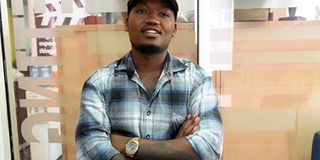Promoting mental health one comic at a time

Mwinga Njoroge. He promotes mental health awareness through comic books. PHOTO | EVANS HABIL | NATION MEDIA GROUP
What you need to know:
- I address triggers and issues such as bullying, dyslexia, parental absenteeism, depression, suicide and bipolar disorder.
- The team at Mental 360 has given me facts and insights into mental health issues, including diagnosis and expert solutions.
Mwinga Njoroge wants to tell the youth — mostly the men — that it’s okay to cry when you’re feeling blue. (That, plus plenty more, of course.)
There are countless ways he could have told them about managing mental issues, but Mwinga has chosen to say it in urban folklore through the sketches, panels and speech bubbles of comic books.
The 25-year-old is knee-deep in the narrative’s creative puddle. This is Mwinga’s story:
***
"I sketched my first piece when I was nine. The pieces weren’t my own original creations — I used to copy the characters from comic books such as Arcadia and Supa Strikas. The sketches were decent, anyone could see I had some budding talent.
I had the idea for my comic books from when I was in the Buruburu Institute of Fine Arts (Bifa). I just didn’t have the time back then to dedicate to its creation.
I have friends and family who you can tell are battling a mental issue or the other. They don’t know how to manage it. Men are raised up not to cry, society considers it weak. Children with mental issues are dismissed as rebellious or naughty.
I also deal with anxiety from time to time. My art — photography, illustrating, painting — is a form of therapy for me. It gives my mind the balance for my overall good health.
MENTORSHIP
I grew up in a village in Thika. After completing high school in 2016, I relocated to Nairobi to join Bifa for a diploma in fine art.
Dad is a schoolteacher who used to draw; mum is a subsistence farmer — they both fully supported me to pursue art as a career.
I’m struggling to find a balance between bringing the comic books to life and working on gigs that pay. The last big gig I had was to illustrate for academic books.
Now I mentor children on art during their school holidays. I teach them about basic form, lines, light and whatnot. Children are more fun to teach than adults are because they are more open to learn.
I’ll release two comic books later this year. One is titled Quest Tooiz. Its primary audience is school kids between 10 and 15 years.
The other is Quest Teeniez, for teenagers and young adults between 16 and 35 years. I also want parents to read them so they can get a peek into the minds of their children, especially during their formative years.
COUNSELLING
The general message in both comic books is to address mental health issues. To identify its triggers, diagnose the issue and share insights on how to manage it.
I address triggers and issues such as bullying, dyslexia, parental absenteeism, depression, suicide and bipolar disorder.
I’m currently listening to a YouTube channel by Alan Watts. Alan is a modern philosopher but he’s brainwashing me.
He says, for example, that the past and future don’t exist, that they’re an illusion. The only thing that exists is the present moment.
I really have to stop listening to him. I listen to Miles Monroe, the late American pastor, to balance myself and realign my religious beliefs with God's.
I collaborated with a non-profit organisation called Mental 360 to write the comic books. Mental 360 does all sorts of work around mental health, including offering free counselling.
FUNDING
The founder of the organisation is called Bright Shitemi. He’s been a dependable resource in the six months of creating the storylines.
The team at Mental 360 has given me facts and insights into mental health issues, including diagnosis and expert solutions.
If I were to be given Sh1 million right this moment, I’d invest it in a modern studio and a team; I need a graphic designer and another illustrator to assist me export my hand sketches from paper to the computer.
I’d also invest in more software and equipment, like a graphics tablet. I’m hopeful I’ll get corporate sponsors to publish, print and distribute the comic books for me.
I don’t want to sell them, I want to give them away at no charge. That way they can reach the teens, young adults and parents who need to read them.
PERCEPTION
Our mental health is as important as physical health. That’s the most important truth I’ve picked up from this journey thus far.
Society doesn’t recognise that mental issues are diseases that should be diagnosed and treated by a professional, just like, say, cancer.
How I intend to make money from the comics is that the sponsorship will include a stipend for me and my team.
I’ve been working on the comic books for the last six months. I don’t have names for the main characters yet but they’re something of super heroes.
A strong boy and strong girl for each of the comics. I don’t want to reveal too much, but there’s also a magic ‘mental issues’ book that drives the storyline."





